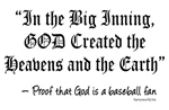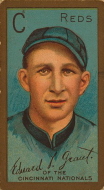The more we look at the past conflicts the United States of America has endured in its history, mainly World War I, World War II and the conflict in Korea, the easier it is to appreciate the men and women who support and are part of our military today. The ones who go to combat and are risking losing their lives everyday are doing it by choice- which is why each of us own them a debt of gratitude. The separation I was talking about in the first paragraph also applies to the rest of the country that are not professional athletes. In the past, because of the draft, so many more people were taken from all different professions and served in the military. For those of us who are not subject to the draft of many years ago, we should all be grateful.
Looking back at World War I, World War II and the Korean War, players in Major League Baseball abandoned their jobs playing professional baseball to serve their country in war. You don't have to go far to know the likes of Ted Williams, Bob Feller and Jerry Coleman- all of whom not only served their country, but put themselves in extreme harms way in doing so. Credit is deserved to all of those who put their lives on hold to risk the thought of being killed or dying in combat at any moment.
But what about the ones who left to serve in a war and did not return? What it said on the back of their "baseball card" didn't really matter as they would not be able to resume their career. In addition, there were many players who were injured while serving and either could not resume their playing career or were not nearly the same ballplayer when they returned. On this date in 1918, MLB OF Tom Burr, who had played in one MLB game for the Yankees in 1914 before enlisting in 1917, was killed in a plane accident in France. A total of 8 MLB players and 3 Negro Leagues players died due to service in World War I.
Former Phillies and Giants 3B Eddie Grant played 10 seasons in the Major Leagues and appeared in the 1913 World Series for the NY Giants when they lost to the Philadelphia Athletics. On October 5, 1918, Grant was put in charge of his battalion after his commanding officer had died in France. He has hit by two shells and killed on the battlefield. RHP Bun Troy pitched in just 1 MLB game for the Detroit Tigers in 1915. Though he was born in Germany, he was serving USA in World War I. He also died in France.
OF Ralph Sharman was 22 when he got into 13 games for the 1917 Philadelphia Athletics. He was serving in the US Army when he drowned while training in Alabama. Harry Chapman was a catcher who played in three Major Leagues, the AL, NL and the Frontier League (for the St Louis Terriers in 1914 and 1915). He also played for the Chicago Cubs and Cincinnati Reds of the NL and the St Louis Browns of the AL for a total of 147 games over 5 seasons. In fact, prior to the 1914 season, he belonged to the Boston Braves of the NL before jumping to Frontier League. Had he stayed in Boston, he may have been part of the team's only World Series Championship in 1914 and would have been teammates with catcher Hank Gowdy. Gowdy holds the distinction of being the only MLB player to serve in both World Wars. Chapman was killed on 10/21/1918 on the battlefield in Missouri from gun shot wounds.
OF Larry Chappell is known for being traded from the White Sox to the Indians as one of the four players traded for Shoeless Joe Jackson. He appeared in a total of 109 games for the White Sox, Indians and Boston Braves over the course of 5 seasons. He died on November 8, 1918 due to the Spanish Flu. C Harry Glenn played 6 games for the 1915 St Louis Cardinals, the same season that HOF 2B Rogers Hornsby made his MLB debut (though they never played in the same game). On the same day that Burr was killed in a plane accident in France (October 12th), the Spanish Flu took the life of Glenn. Newt Halliday was a 1B who got one at bat in a game in 1916 for the Pittsburgh Pirates. He died on April 6, 1918 due to pneumonia while serving in the US Navy in Great Lakes, IL.
Norman Triplett was a backup OF for the Negro League's Hilldale Daisies in 1917. On October 20, 1918, he died of a disease while serving his country. Catcher Pearl Webster played in the Negro Legues from 1912-1917 and died as a result of the Spanish Flu on November 16, 1918- less than a week after World War I was over. The only other known Negro Leagues player to die as a result of WWI was Ted Kimbro, who also died of the Spanish Flu.
I was interested in talking about all the players who have died serving their country in wars. However, due to the amount of players who passed during WWI, I focused this piece on just that. Stay tuned for more similar discussions.


 RSS Feed
RSS Feed
